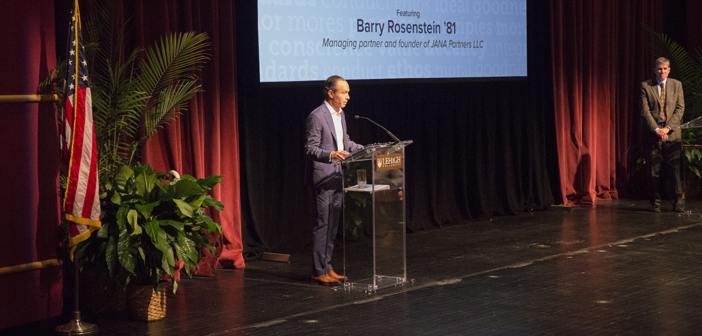Lehigh alumnus, Barry Rosenstein, ’81, returned to Lehigh on Nov. 7 to speak on the topic of ethics and shareholder activism. The speech was moderated by Pat Farrell, the provost and vice president for academic affairs.
Rosenstein spoke about his time at Lehigh, his experience in the financial industry and the ethical issues he has faced in the past.
Rosenstein, the founder and managing partner of JANA Partners LLC, was brought in to speak as part of Lehigh’s speaker series on ethics, supported by the Endowed Fund for the Teaching on Ethical Decision Making.
Rosenstein received a Bachelor of Science in accounting from Lehigh and continued his education at the University of Pennsylvania’s Wharton School of Business, where he received a master’s degree in business administration.
Reflecting on his Lehigh experience, Rosenstein said what he valued most was the rigor.
“I worked harder here that I did at Wharton,” Rosenstein said. “I got a great education at a great school and met great people. I don’t regret coming here for a minute.”
He said it is a miracle to be where he is today, but he does not credit it simply to good luck.
He mentioned the importance of being nice to people in business situations and said that “acts of genuine human decency” can set people apart in the industry.
“Activism is like most other professions, except perhaps reality TV, in that you can make it ethical,” Rosenstein said. “That’s what I, my partners and my team try to do everyday.”
Rosenstein addressed what it means to be a shareholder’s activist, the concepts of winning and playing fair, and the negative perceptions of his field. He began his speech by tackling the idea of winning.
“Winning isn’t just getting what you want, it’s also about getting to who you want to be,” Rosenstein said.
Rosenstein said it does not matter how successful you have been if you don’t like what you see. He said by investing in public companies, and trying to raise stock prices, the company’s operational performance can go up, improving the company as a whole.
The second major point Rosenstein addressed was the fact that being a shareholder’s activist does not mean having to play dirty.
Rosenstein commented on the importance of acting ethical in every situation. He said most companies will face an activist at least once, but shareholders will see the same activists many times.
“Who we are and how we hold ourselves defines us,” Rosenstein said.
After Rosenstein’s lecture, audience members were given the chance to ask him questions in an open Q&A session.
Rosenstein advised students not to do anything that might be seen as “gray area.” He said he knew peers who went to prison for their unethical actions.
During the Q&A session, Rosenstein commented on the change in his business from its beginning to now. He said in the past, management and CEOs were resistant to shareholder activists, who were controversial.
He said now he never gets resistance from management, and CEOs are almost expecting calls from shareholder activists, often ready to take their ideas and adopt them as their own. He said management encourages activists to be agents of change and said that companies are essentially owned by their shareholders.
“I appreciated that he was willing to get into technical aspects of finance and investment with students,” Jake Zebaida, ’20, said. “I think a lot of speakers are reluctant to do that. They want to go on stage, give a fluff speech and get off stage. I appreciate that he was willing to go the extra mile and dig into what he does on a daily basis with current students.”
Alex Fuchs, ’17, said the best parts of Rosenstein’s speech were his personal stories and experiences.
“The way he does his job is interesting, as he seems to be relatively well-liked by his companies as opposed to what you hear about corporate invaders,” Fuchs said. “I figured it would be interesting to hear his ideas on ethics, considering the space he is in.”
Rosenstein recommended students get a job in something interesting. He also stressed the importance of gaining practice and experience.
Rosenstein credited fear as his personal inspiration.
“I had no back up plan,” Rosenstein said. “I had to make it. I had no alternative, so fear was my motivation. Advice for students — work as hard as you can, there’s no substitute for that. If you’re not willing to do it, somebody else will.”






Comment policy
Comments posted to The Brown and White website are reviewed by a moderator before being approved. Incendiary speech or harassing language, including comments targeted at individuals, may be deemed unacceptable and not published. Spam and other soliciting will also be declined.
The Brown and White also reserves the right to not publish entirely anonymous comments.